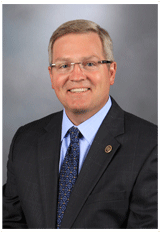The General Assembly spent the last full week in March on spring recess. During the annual break, lawmakers return to their districts to visit with constituents and local groups. The brief respite gives lawmakers a chance to see what we’ve done legislatively so far, and what tasks still remain. One of the most important responsibilities is the budget, which will soon be heard by the full Senate chamber.
The state budget is where legislative ideas meet fiscal reality. There are numerous proposals and plans that could benefit our state. However, those cost funds, which are provided by hard-working, tax-paying citizens. They pay for every government program, every initiative, every state effort. We work with a limited budget based on general revenue. The state can’t spend more than it receives. This forces us to make tough decisions on how we allocate dollars. It also requires the Legislature to prioritize state government services.
It does make the process difficult, and necessitates compromise, but also imposes fiscal responsibility in the process. Our state spending plan must be balanced. Lawmakers must allocate taxpayer dollars as wisely and prudently as possible. We’ve made tough choices in the past, but those decisions allowed us to weather rough economic times and maintain our state’s AAA credit rating. A positive credit rating allows us to issue bonds with lower interest rates to repair state infrastructure, which is something we’re looking at this session.
The budget process for Fiscal Year 2016, which starts July 1, 2015, is well underway. The task started last December, when the governor and Legislature agreed on the state’s Consensus Revenue Estimate (CRE), used to determine the amount of general revenue funds the Legislature will appropriate to state departments, programs and services. Net general revenue collections in FY 2016 are expected to be $8.673 billion, a growth of 3.6 percent. All total, we’ll be working with a $26.1 billion budget.
Unlike last year, the governor and Legislature agreed upon this year’s CRE. In 2014, the executive branch proposed slightly more optimistic revenue projections. The General Assembly instead opted for a more conservative estimate. The final figure was closer to the Legislature’s. I point this out as a reminder that when we’re creating the budget, it’s important we take a pragmatic approach to revenue growth. If revenue does meet high expectations, those funds are always available. If they don’t, then we have a workable budget that education, transportation and state departments can depend on.
The budget process is quickly progressing. The House recently passed its version of the state’s spending plan. The Senate Appropriations Committee, on which I sit, has already started making changes to the other body’s version of the budget. As in years past, I will fight to fund necessary and much-need projects within our area and support Missouri’s K-12 and higher education institutions. The smartest investment we can make is in our students, and through them, the future of our state.
After the committee approves the bills, they will move to the full Senate for broad debate, where the majority of funding discussion amongst the whole chamber takes place. After approving those bills, the House and Senate will go to conference committee to hash out any differences. Those final bills will then be approved by both bodies. The deadline to pass the FY 2016 budget is May 8, at 6 p.m. By then, if not earlier, the Legislature will have delivered to the governor a balanced budget—legislators’ most important, and only constitutionally required, duty.
As always, please feel free to contact me or my staff with any questions or concerns at any time. We look forward to hearing your comments and suggestions and trying to answer any questions you may have. You can reach us by phone at 866-277-0882 (toll-free) or (573) 751-2272, or by fax at (573) 526-7381.
Senator David Pearce serves Caldwell, Carroll, Howard, Johnson, Lafayette, Livingston, Ray and Saline counties in the 21st State Senatorial District. |



